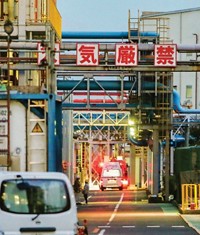Advertisement
Grab your lab coat. Let's get started
Welcome!
Welcome!
Create an account below to get 6 C&EN articles per month, receive newsletters and more - all free.
It seems this is your first time logging in online. Please enter the following information to continue.
As an ACS member you automatically get access to this site. All we need is few more details to create your reading experience.
Not you? Sign in with a different account.
Not you? Sign in with a different account.
ERROR 1
ERROR 1
ERROR 2
ERROR 2
ERROR 2
ERROR 2
ERROR 2
Password and Confirm password must match.
If you have an ACS member number, please enter it here so we can link this account to your membership. (optional)
ERROR 2
ACS values your privacy. By submitting your information, you are gaining access to C&EN and subscribing to our weekly newsletter. We use the information you provide to make your reading experience better, and we will never sell your data to third party members.
Business
Earthquake Rocks Japan's Chemical Industry
Disaster: Many firms' plants are shut down indefinitely as nation struggles through aftermath
by Jean-François Tremblay
March 14, 2011

Much of Japan's chemical industry reports a near standstill in operations in the wake of the massive earthquake and tsunami that struck that country on March 11. Most firms say that their facilities and personnel appear to be unharmed, but power shortages are keeping many plants offline, and managers don't know when they can restart.

Few chemical plants in Japan are located in the coastal zone that was ravaged by the tsunami or in the danger zone for radioactive fallout from some of the country's crippled nuclear reactors. The few companies with facilities in those areas generally haven't disclosed the extent of any damage.
Many large Japanese chemical companies-- Mitsubishi Chemical, Shin-Etsu Chemical, Kyowa Hakko Kirin, Sumitomo Chemical, JSR, Kuraray, Mitsui Chemicals, and others—operate facilities in Chiba and Ibaraki, two prefectures that neighbor Tokyo to the northeast. Firms in those areas say the quake triggered automatic emergency shutdown of their plants. However, some companies report being able to resume operations.
A raging fire at the Cosmo Energy refinery in Chiba that began March 11 touched off an overnight fire at the neighboring Chisso polyethylene and polypropylene plant, Chisso reports. Chisso says that none of its workers were injured and that damage to the facility is relatively light.
Polysilicon producer Tokuyama has a subsidiary, Tohoku Shannon, located in Japan's Tohoku area, which was devastated by the tsunami. Tokuyama says it is assessing damage to the subsidiary and to its facilities elsewhere in Japan.
Chemical manufacturer Tosoh says its staff in the Tohoku area is safe, including the staff of a plant in the town of Ishinomaki, which was largely destroyed by the tsunami. This facility was flooded and Tosoh says the extent of the damage is unclear.



Join the conversation
Contact the reporter
Submit a Letter to the Editor for publication
Engage with us on Twitter